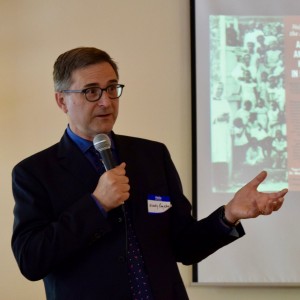Letter from the Director
March 3, 2020
It is fair to say that three years ago, when I handed the provost a proposal for what we are now calling the Roberson Project, I did not foresee – in fact, I could not have imagined – the diverse directions in which this program has since developed or the array of creative and important initiatives it would launch.
Sure, I knew we would be diving into archival research into the university’s historical involvement in slavery. But I had not expected our young researcher, Tanner Potts, C’15, to discover in his first month of work a multi-page document that has shaped our investigations ever since: a list of the names of nearly three hundred persons from across the “plantation states” pledging the astronomical sum of $1.2 million to the founding of a university specifically for the slaveholding region.
Yes, I knew we needed to revisit and reconsider the painful schism of 1952-1953, when the university’s trustees voted to prohibit the racial desegregation of the School of Theology and prompted the mass resignation of the seminary’s faculty. But I did not expect a first-year seminarian, Hannah Pommersheim, T’19, to come forward with a revealing investigation into those years that has helped us see those dissident scholars as spiritual and moral leaders long overdue our appreciation and gratitude.
Of course, I understood that the project needed to be of service and use to the larger Episcopal Church community. But I did not foresee that Hannah and her fellow theology student Kellan Day, T’19, would collaborate in designing a curriculum to help parish priests steer their congregations in discerning how to respond, as Episcopalians, to the Confederate memorials that their churches harbor. Nor did I imagine that this past November Kellan and Hannah would stage a pilot workshop based on that curriculum and that a dozen priests would attend.
I also really was not sure what would happen when I proposed to reach out to present and former African American residents of Sewanee and their descendants to recover and preserve their histories on the Mountain. Little did I know that this idea would grow into something extraordinary, thanks to a team of inspired organizers — Shirley Taylor, Sandra Turner, Carl Hill, Jr., Jimmy Staten, Jackie Duncan, James Burnett, Doug Cameron, and dozens of others. Together they injected energy into this initiative and helped start a community-based archive that promises finally to do justice to the generations of African Americans whose labors and sacrifices made Sewanee the university and community that it was in the past and is today.
I would be happy to continue in this vein, naming important names and exciting projects underway. But instead, allow me to identify the common theme that runs throughout these and the many other examples I could cite.
The Roberson Project — all that it has done to this point, and all that it will do over the next three-plus years — is a collective endeavor. It reflects the dedication, creativity, and hard work of a diverse and inclusive pool of talented and dedicated people from across our campus and community. We have students and alumni of the College and School of Theology to thank. Members of both faculties and the staff of the university are critical partners. Representatives of the Episcopal Church, including those with no direct ties to Sewanee, have lent invaluable support. And people with family ties to the historic African American neighborhoods of Sewanee have come from near and far to add their stories to what we know about how Sewanee came to be.
This newsletter (our second) recounts some of the important projects of the last six or so months. But it also is a kind of “thank you” note to all who have joined in on the work we have begun. Whether you have pitched in to help take oral histories at one of the “Save Sewanee Black History” days, attended the lectures we have organized on campus, or just followed us on Facebook or Instagram and “liked” what we post there, you have made an meaningful contribution to this important project of the University of the South and its far-flung community.
To say the least, we are grateful to you all.


